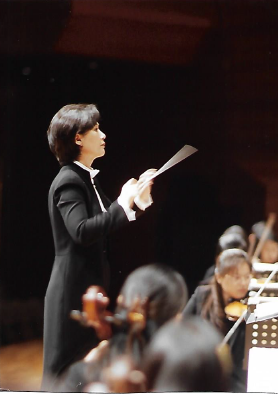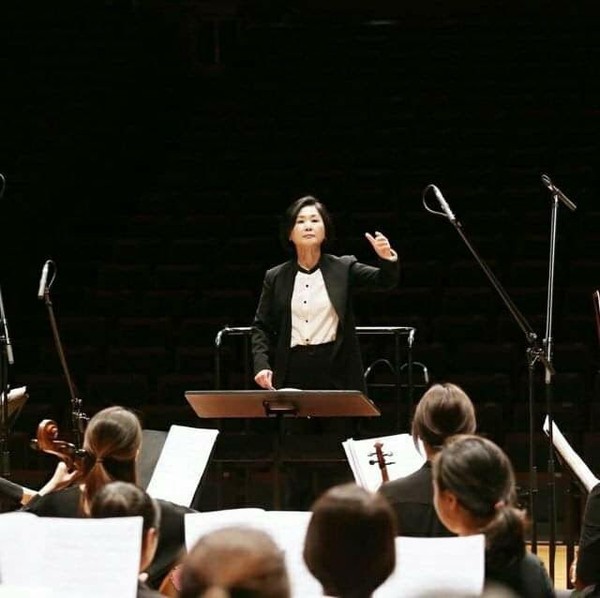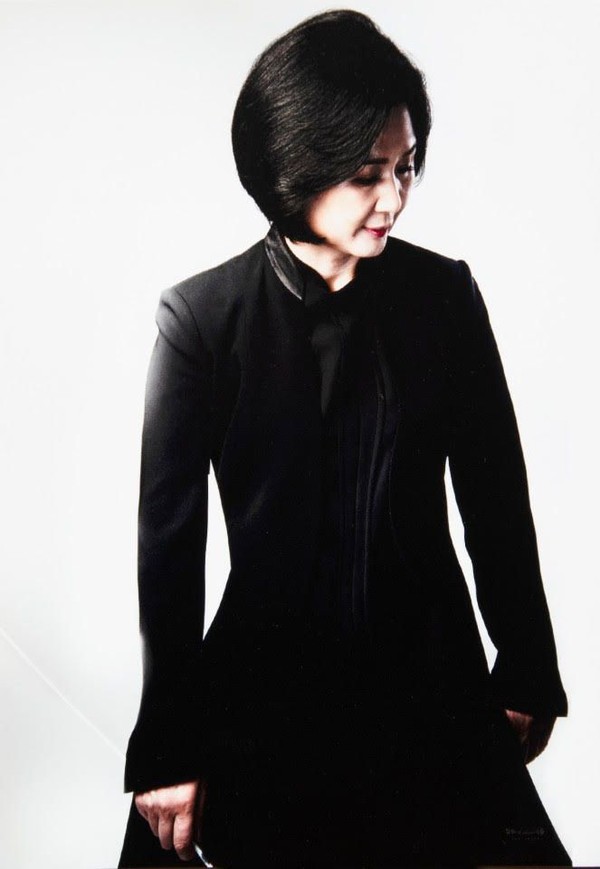
Have you ever seen an orchestra perform? It's a magnificent combination of string, woodwind, brass, and percussion instruments. At the center of every orchestra is the conductor who leads the musicians. The conductor is also referred to as a musician who recreates music. SMT interviewed Professor Kim Kyounghee, pioneer of Korean female conductors.
Before beginning the interview, would you please introduce yourself to our readers?
My name is Kim Kyounghee, and I am a professor in the Department of Orchestra Music at Sookmyung. I've worked here at Sookmyung for 30 years. I am also the first female orchestra conductor in Korea. I have also worked as a conductor of the Gwacheon Philharmonic Orchestra and an artistic director as well as a conductor of the Jeonju Philharmonic Orchestra. During that same period, I conducted the KBS Symphony Orchestra, Seoul Philharmonic Orchestra, Busan Philharmonic, Daegu Philharmonic, Suwon Philharmonic, Incheon Philharmonic and so on. I took the Sookmyung Philharmonic Orchestra to the Sydney Opera House and Vladivostok Philharmonic Hall in Australia and conducted the Indiana University Orchestra at the invitation of Indiana University. Although I am well over 60 years old, I passionately conduct orchestras on any stage with faith and love of music.
You are a graduate of Sookmyung Women's University with a major in composition as well as a graduate of Berlin University of Arts with a major in conducting. What made you major in conducting after graduating from Sookmyung?
In more recent years, Korean universities have begun offering an environment where students can learn to conduct. However, when I was a university student, no such major existed, and there were very few symphony orchestras and conductors. For those reasons, I majored in composition and then went overseas to major in conducting. A music critic who attended the same church I went to said, "You are better suited to conducting than composing, so why not become a conductor?" I was unfamiliar with conducting and not confident, so I decided to first start conducting a choir. The critic also told me that I would be entering new ground, a path no one else had travelled. I was able to enter the department of orchestra conducting at the Berlin University of Art in 1993 with only a background in composition from Sookmyung.

What attracted you to composition and conducting?
Composing involves creating while conducting is re-creation. In other words, the composer creates what does not exist, and the conductor recreates what is already created. Each conductor produces different music. However, both involve some form of creation. I am fascinated by both composing and conducting.
Earning the title of first female orchestra conductor must not have been easy. What comes to mind as the most precious moment?
Winning the title of a front-runner is not the only best value. What's more important is how responsible you are and how well you have come up with and that's when the title has its meaning. In the past, it was unusual to see a woman standing in front of an orchestra and conducting. I felt the pressure of being there, but I endured it with the thought that why does it matter that I am a female when other females were playing the instruments. It is difficult to make music with others, so I was very nervous and tired, but I was grateful. I was rewarded by the end results, creating harmony at a music hall.
How did you overcome hard times?
The most difficult task for a conductor is rehearsal because I must create music in front of the orchestra members without any instruments. I always felt rehearsal was like walking through a minefield. I also have to engage in psychological warfare in order to deal with people and listen to their musical instruments. As a conductor, I must have strong hearts because I need to manage the music and the musicians together. Although I love music, I feel that is the most difficult task for me.

Then, what was your most memorable and rewarding moment?
I was happiest when orchestra members, who once ignored me as I was a female conductor, came around. They would say they felt the joy and emotion of the music thanks to me. The applause of the audience is also wonderful, but in the end, being recognized by fellow musicians is my biggest reward.
You were active with both Korean and foreign orchestras. What has been the most impressive experience conducting orchestra?
Among my conducting experiences, I really recall my experience of conducting the eight-nation concert orchestra in Japan. It was incredible to witness orchestra members coming to practice an hour early. It was also wonderful to see the musicians smiling broadly, enjoying themselves as they played leisurely on the stage. Moreover, I was quite surprised by their consideration. They met me at the airport upon my arrival and saw me off when I left so that I could wholly focus on music. Compared to that experience, the atmosphere of a symphony orchestra in Korea is a little heavy. I would like to see it take on an air of trust among the musicians by encouraging, caring, and practicing each other with a warm heart. However, it's not easy with everyone having different ideas. The memories of each stage performance are all precious and impressive to me.
As the first female conductor in Korea, you must have had to endure social prejudices, especially since the profession was male-dominated. What difficulties did you experience?
Indeed, but the profession is still difficult for female conductors. On one visit to Jeonju Philharmonic Orchestra as an invited conductor, I saw an article with the headline 'Conductor who pierced the glass ceiling'. That would never have been written if I were a male. Being a conductor is a rare profession for a woman, so there are few opportunities for women. Today, more and more women are entering the profession in Korea, and I hope they will be recognized for their pure ability and not be compared to males.

Many students see you as a role model. Do you have anything to advise them? And, is there anyone who influenced you too?
Please study the basics of conducting hard and listen to a variety of music. You need to reproduce music but at the same time, make it your own, so I hope you study the techniques and music interpretations of many conductors in depth. I also hope you keep a proper attitude toward music. The world has many great conductors, but I especially like the conducting style of Carlos Kleiber from East Germany. There is freedom in his framework of conducting. While I've been conducting for many years, I still aspire to be like him someday.
What does it mean as a professor to present good music to the public as well as conduct an orchestra that harmonizes with everyone?
Making sheet music come to life at the hands of a conductor is hard work. Unaccompanied music can be made and delivered by the single person with their sheet music, but with an ensemble, you also need to consider melody and Mars. Therefore, the process of uncovering which kind of music is best suited to which instrument for a particular sound is what makes an ensemble attractive. The efforts of the conductor and all of the individuals can finally impress audiences. I feel like I am creating something out of nothing.
The music performance sector has been hit hard by COVID-19. How is the conductor making an orchestra impressive with directly meeting the audience?
A conductor who has no technique would not be able to do it. First, the conductor must play according to social distancing regulations. For example, stringed and percussion groups must wear masks on stage while wind instrument musicians socially distance themselves by playing in choir seats or other spaces where they can still see the conductor. There is a need to come up with alternatives to the traditional way of broadcasting an orchestra on the large screen. If any of you have suggestions, I'm sure each orchestra would love to hear from you.
Last, do you have any final words that you would like to leave for Sookmyungians?
You may not be sensing it now, but the time will come when you realize that this time at Sookmyung Women's University was truly the golden age of your life. 'Challenge new paths and keep striving towards the ticker tape'. Before you know it, you'll see your wishes come true.

Kim Kyounghee
-Graduate of Sookmyung Women's University, Department of Music Composition
-Graduate of Hochschule der künste Berlin, Department of Orchestra Conduct
-Conducted with KBS Orchestra, Seoul City Orchestra, Daejeon City Orchestra, Busan City Orchestra, and other multiple orchestras, both domestically and internationally
-Standing Conductor of Gwacheon City Orchestra, standing Conductor and Artistic Director of Jeonju City Orchestra, successive
-Chairperson of Korean Conductors Association, successive
-Sitting Professor, Department of Orchestra Music, Sookmyung Women's University
Na Cho Seongah / Society Section Editor
smt_csa@sookmyung.ac.kr
Kim Lee Jiwon / Cub Reporter
smt_ljw@sookmyung.ac.kr


